
Compliance Risks for Behavioral Health Facilities in 2025
January 8, 2025In 2025, cybersecurity in mental health care faces increased scrutiny as data privacy aligns with evolving HIPAA regulations and new state-level privacy mandates. Leaders must adapt to these shifts while upholding their dedication to patient-centered care and operational excellence.
Non-compliance introduces significant risks—financial penalties, reputational damage, and operational instability—potentially compromising the facility’s ability to fulfill its mission of enhancing mental health services.
Proactive measures enable facilities to stay resilient. With the specialized expertise of John Lynch & Associates, your organization can confidently manage these complexities, reinforcing compliance and trust. This ensures uninterrupted focus on providing outstanding patient care.
The Evolution of Behavioral Health Regulations in 2025
Behavioral health regulations are entering a new phase in 2025, driven by the need for greater accountability, patient safety, and operational transparency. As services expand—particularly in areas like telehealth—regulatory bodies are responding with tighter standards to ensure consistent care across diverse platforms.
New Standards in Documentation
Accurate and detailed documentation has long been essential in behavioral health, with 2025 bringing even more rigorous standards. New documentation requirements demand greater specificity, ensuring patient records are both comprehensive and prepared for heightened audit scrutiny.
Failure to meet these evolving standards exposes facilities to penalties and operational setbacks, potentially disrupting care delivery and straining resources.
By enhancing documentation practices and equipping staff with the right training, organizations can mitigate compliance risks and strengthen the quality of patient care. This approach not only safeguards operations but also reinforces a commitment to excellence in behavioral health.
Increased Telehealth Oversight
Telehealth services have become an integral part of behavioral health delivery, offering flexibility and expanding patient access. Yet, this growth comes with regulatory strings attached. In 2025, telehealth compliance in behavioral health will face heightened oversight, particularly around licensing, billing practices, and informed consent.
Without structured workflows, facilities risk inconsistencies that could lead to costly penalties or disrupted services. By integrating robust telehealth protocols, behavioral health organizations can continue providing seamless virtual care while ensuring compliance at every touchpoint.
Compliance Challenges for Behavioral Health Leaders
In the fast-paced world of behavioral health, ensuring compliance is not just a regulatory requirement—it’s essential for protecting patients and maintaining operational integrity. As the industry grows, so do the challenges facing leaders responsible for keeping their organizations aligned with evolving standards.
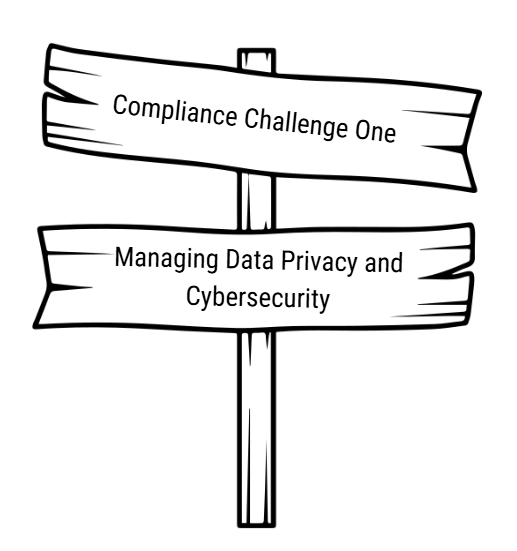
Managing Data Privacy and Cybersecurity
With digital tools and telehealth becoming embedded in behavioral health services, protecting patient information is paramount. Yet, as technology advances, so do the methods used by cybercriminals to exploit vulnerabilities. In fact, healthcare organizations—including behavioral health facilities—are now prime targets for ransomware attacks and data breaches.
As cyber threats grow more sophisticated, behavioral health facilities will face intensified scrutiny over data privacy and cybersecurity, driven by evolving HIPAA standards and emerging state-level regulations in 2025. Facilities that fail to implement adequate protections not only risk hefty fines but also jeopardize patient trust and long-term reputation.
For many behavioral health leaders, limited budgets and stretched IT teams make robust cybersecurity feel out of reach. However, the cost of inaction is far greater. Cyber incidents can lead to service disruptions, legal battles, and long-term financial damage. By partnering with cybersecurity experts and adopting scalable protection strategies—such as encrypted communications, regular vulnerability scans, and staff phishing awareness programs—leaders can significantly reduce risk.
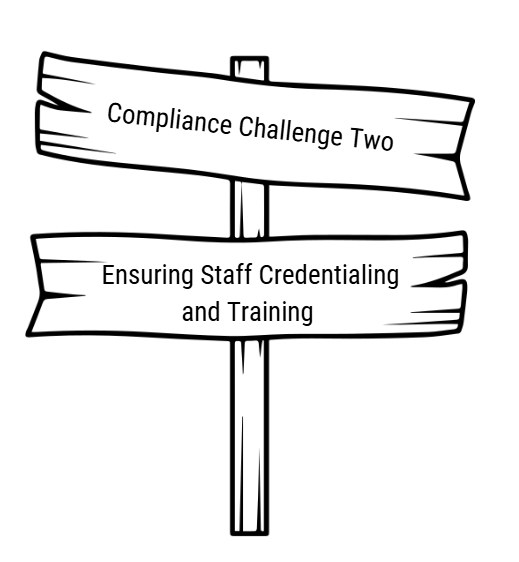
Ensuring Staff Credentialing and Training
In behavioral health, compliance is directly tied to the qualifications and readiness of the care team. Regulatory bodies are intensifying their focus on staff credentialing in behavioral health, making it clear that facilities must maintain comprehensive records for every team member— from licensure renewals to specialized certifications.
Beyond initial credentialing, ongoing professional development is becoming a critical compliance factor. Behavioral health professionals must stay current with best practices, ethical standards, and new treatment protocols. This reflects not only on the quality of care provided but also on the facility’s ability to remain in good standing with accrediting organizations.
Gaps in training or lapsed credentials can trigger non-compliance penalties, delay patient care, and even result in the suspension of services. To avoid these pitfalls, facilities are investing in automated credentialing systems and learning management platforms that track staff progress, flag upcoming expirations, and ensure timely re-certification. These proactive measures help mitigate compliance risks while reinforcing a culture of excellence and accountability.
The High Stakes of Compliance in Behavioral Health
Compliance in behavioral health is more than just a regulatory obligation—it’s a cornerstone of sustainable operations and quality patient care. As scrutiny intensifies in 2025, the consequences of non-compliance extend far beyond fines, affecting every aspect of a facility’s performance and reputation.
Financial and Operational Risks
The financial repercussions of non-compliance are immediate and significant. Regulatory agencies are increasing penalties for violations, with some fines reaching into the millions. More than just monetary losses, facilities may experience operational disruptions, staff shortages, and the need to divert resources toward addressing violations—resources that could otherwise be allocated to patient care and program development.
A reactive approach to compliance, where risks are addressed only after issues arise, leaves organizations vulnerable. For many behavioral health facilities, even minor infractions—such as lapses in documentation or outdated staff credentials—can compound over time, triggering audits, service interruptions, and funding cuts. Proactive compliance strategies, on the other hand, safeguard financial stability by identifying risks early and embedding corrective measures into daily operations.
Impact on Patient Trust
Compliance plays a vital role in maintaining the trust and confidence of patients and the broader community. Behavioral health services rely heavily on strong therapeutic relationships, and any sign of operational disarray—whether through data breaches, staff credentialing errors, or telehealth mismanagement—can erode that trust.
Patients expect their mental health information to be handled with the highest level of security and care. Any compliance failure that compromises privacy can lead to disengagement, reduced appointment attendance, or even legal action. In contrast, facilities that demonstrate rigorous adherence to behavioral health regulations in 2025 not only protect their patients but also enhance their reputation as safe, trustworthy providers.
Building a culture of compliance signals to patients, staff, and regulators that the facility prioritizes ethical care, accuracy, and accountability. This fosters long-term relationships, strengthens community ties, and helps retain staff by reinforcing a positive, mission-driven work environment.
Proactive Strategies for Behavioral Health Compliance
Compliance in 2025 requires more than meeting minimum standards—it demands foresight, adaptability, and a commitment to continuous improvement. Behavioral health leaders who prioritize proactive strategies position their facilities not only to meet evolving regulations but to thrive under them.
Conducting Regular Compliance Audits
Routine compliance audits are critical for identifying vulnerabilities before they evolve into costly violations. These audits offer a structured review of operations, documentation, and workflows to ensure alignment with the latest behavioral health regulations in 2025.
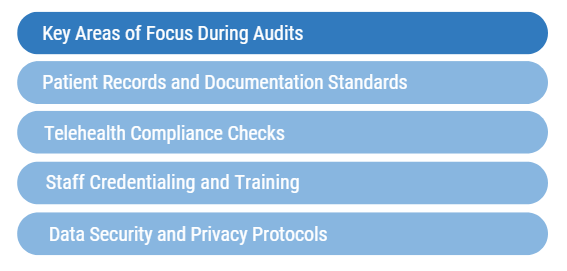
Key Areas of Focus During Audits:
- Patient Records and Documentation Standards
Auditors meticulously review patient files to ensure that behavioral health documentation standards are met. This includes verifying completeness, accuracy, and timeliness. Missing or inconsistent notes, unsigned forms, or inadequate treatment plans can signal red flags that increase the likelihood of penalties during external audits.
- Telehealth Compliance Checks
With telehealth compliance in behavioral health under greater scrutiny, audits must assess virtual care processes. This involves verifying that telehealth services comply with licensing laws across state lines, patient consent is properly documented, and billing practices reflect the care provided.
- Staff Credentialing and Training
Regular audits help track staff credentialing in behavioral health, ensuring that all professionals’ licenses and certifications are up to date. Auditors will also evaluate whether staff training logs demonstrate ongoing professional development, reducing the risk of non-compliance tied to unqualified personnel.
- Data Security and Privacy Protocols
Audits assess how well facilities align with data privacy in mental health services and HIPAA guidelines. This includes reviewing cybersecurity measures, access control systems, and incident response plans to safeguard patient information. Any gaps in data encryption or staff handling procedures may be flagged for immediate correction.
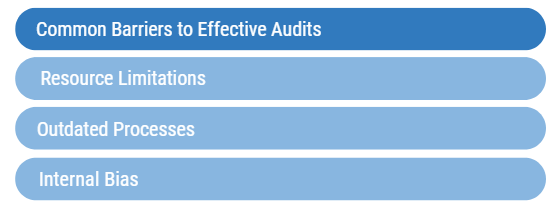
Common Barriers to Effective Audits:
- Resource Limitations – Smaller facilities may lack dedicated compliance officers or teams to perform regular audits, resulting in oversight gaps.
- Outdated Processes – Relying on manual record-keeping increases the risk of human error and makes audits more time-consuming.
- Internal Bias – Internal teams may unintentionally overlook issues, especially when ingrained practices conflict with updated regulations.
Regular audits are essential for maintaining the integrity and security of healthcare systems, ensuring compliance with evolving regulations, and safeguarding sensitive patient information.
Since 2018, one of our clients has made remarkable strides in establishing a robust compliance framework, transforming from having no formal program to a fully operational Risk Management process by 2020. Initially facing 11 Critical and 5 High Priorities, they successfully reduced this to 0 Critical and 3 High Priorities by 2023, reflecting their dedication to continuous improvement.
Key achievements include the complete mitigation of all critical risks, 100% staff HIPAA training compliance, and zero breaches reported in the past year. Through the implementation of multifactor authentication, comprehensive encryption, and enhanced incident management protocols, the client has significantly strengthened its cybersecurity posture.
These advancements, coupled with ongoing risk assessments and regular leadership oversight, demonstrate their unwavering commitment to protecting patient data and upholding the highest standards of healthcare security.
Explore the full case study Transforming HIPAA Compliance in a Behavioral Health Facility to learn more about the strategies and outcomes.
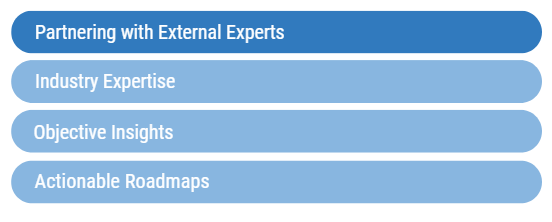
Partnering with External Experts:
Engaging third-party specialists for compliance audits introduces a fresh perspective and ensures no stone is left unturned. External auditors bring:
- Industry Expertise – Deep understanding of the latest behavioral health regulations in 2025 and how they apply to various facility models.
- Objective Insights – Independent assessments minimize internal bias and provide actionable feedback tailored to facility needs.
- Actionable Roadmaps – Beyond identifying risks, external partners help design corrective action plans to close compliance gaps efficiently.
Facilities that prioritize regular audits not only mitigate risks but foster a culture of accountability, transparency, and operational excellence.
Leveraging Technology for Documentation and Monitoring
Digital transformation is playing an increasingly vital role in behavioral health documentation standards. Automated systems reduce manual errors, ensure timely updates, and improve data accuracy—all of which contribute to better compliance outcomes.
Facilities that integrate electronic health records (EHRs), automated credentialing platforms, and telehealth monitoring tools are better equipped to handle the complexities of modern compliance. For instance, AI-driven tools can scan documentation for inconsistencies, flag potential audit risks, and provide recommendations for corrective action.
Beyond documentation, technology enables real-time monitoring of cybersecurity measures, helping facilities address threats before they escalate. Investing in these solutions not only protects against penalties but frees up staff to focus on patient care, enhancing the overall efficiency of the organization.

Navigating 2025 with Confidence
The compliance landscape for behavioral health facilities in 2025 presents both challenges and opportunities. Expanding regulations, stricter oversight, and evolving cybersecurity threats emphasize the need for vigilance and proactive planning. However, with the right strategies in place, compliance becomes more than just a regulatory obligation—it becomes a pathway to operational excellence, patient trust, and long-term success.
Ignoring compliance risks leaves facilities vulnerable to financial penalties, operational disruptions, and reputational damage. In contrast, investing in robust documentation practices, rigorous staff credentialing, and cutting-edge technology creates a solid foundation for sustainable growth.
By partnering with John Lynch & Associates, behavioral health leaders gain access to the expertise and resources needed to navigate these complexities. From conducting comprehensive risk assessments to implementing advanced telehealth protocols, our team is dedicated to helping you achieve compliance while focusing on what matters most—delivering exceptional patient care.
Ready to protect your facility and empower your team? Contact us today at 623-980-8018 to schedule a compliance risk assessment today and take the first step toward securing your future.
